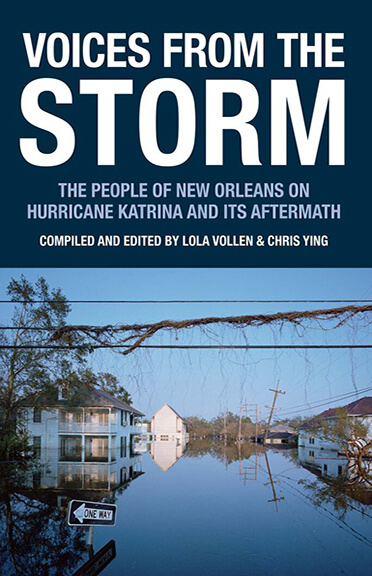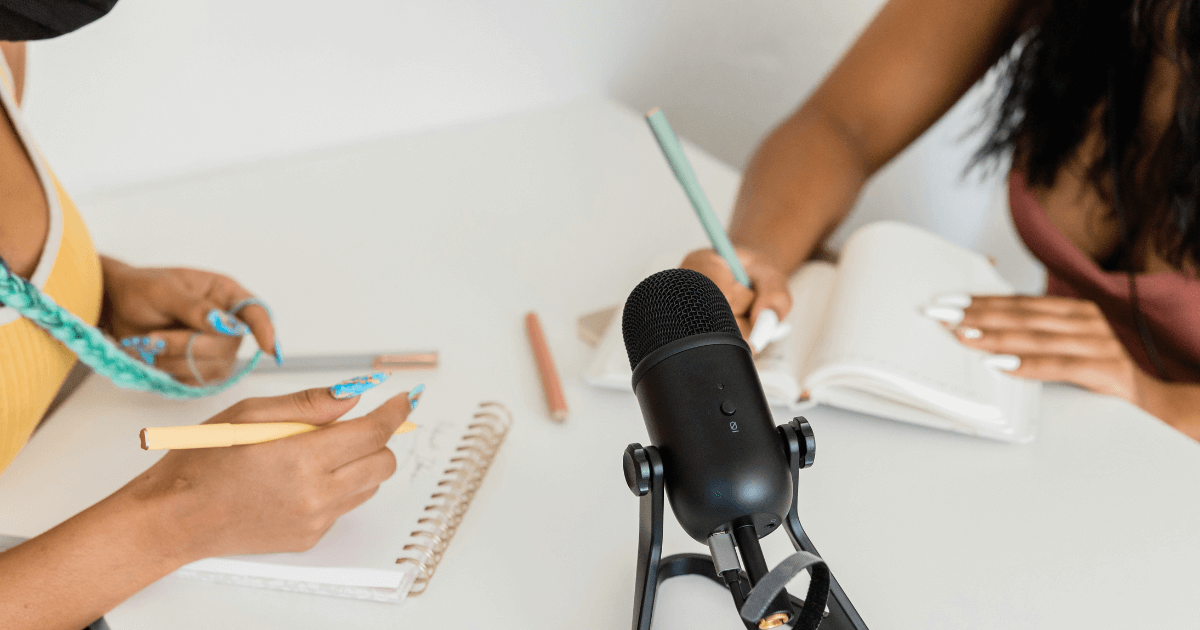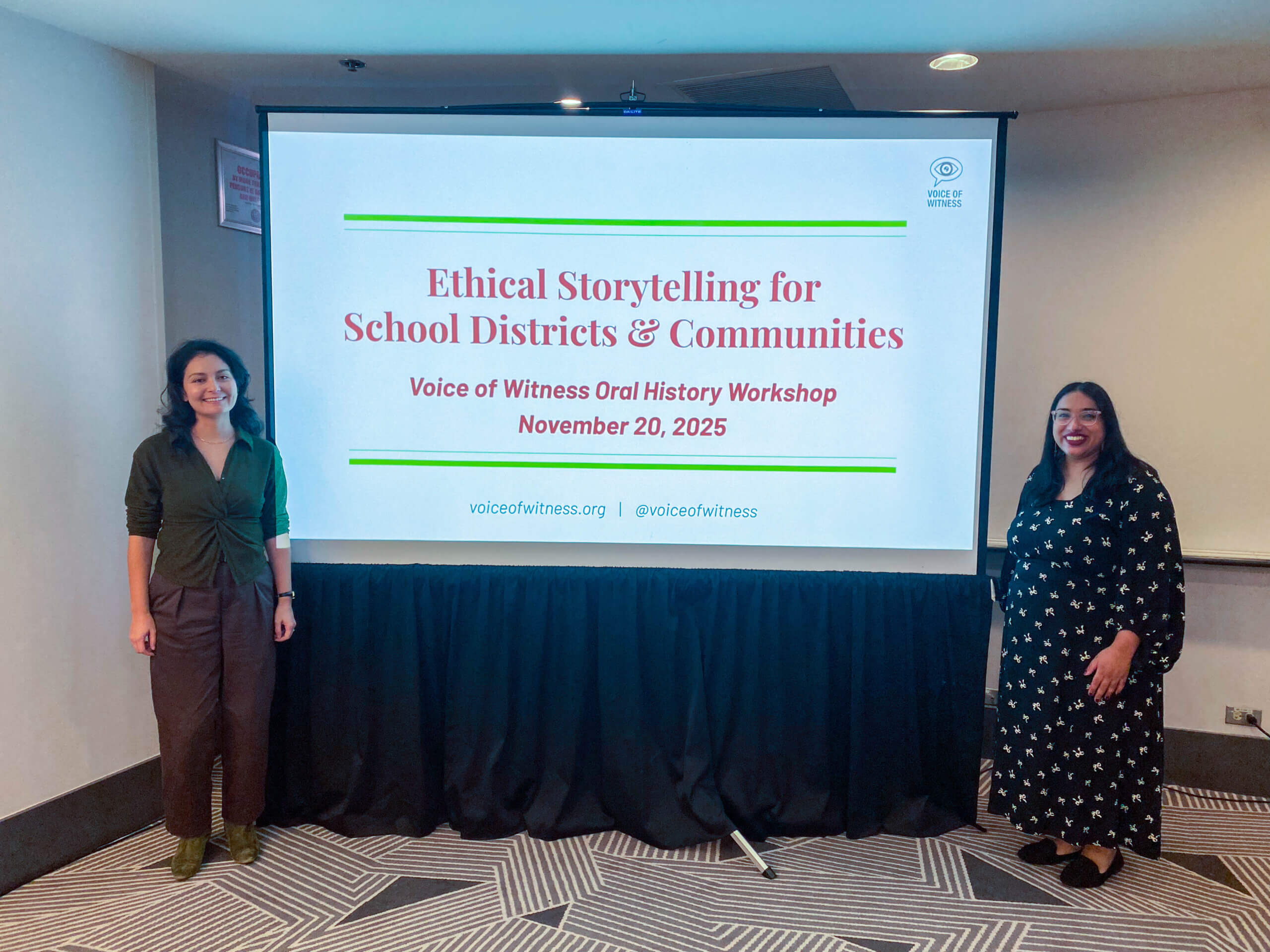2019 marks 10 years for Voice of Witness as a nonprofit, and in celebration of this exciting milestone, we’re resurfacing powerful stories from every oral history book in our series. Though time has passed since these stories were first published, many of the themes and issues they address are as relevant and important as ever.

19 years ago, Hurricane Katrina inflicted damage on a scale unprecedented in American history, nearly destroying a major city and killing thousands of its citizens. With far too little help from indifferent, incompetent government agencies, the poor bore the brunt of the disaster.
The residents of low-income and marginalized communities suffered incalculable losses and endured unimaginable conditions. And the few facilities that did exist to help victims quickly became miserable, dangerous places.
In the aftermath, the victims of Hurricane Katrina found themselves spread across the United States, far from the homes they left and faced with the prospect of starting anew. Though nearly two decades have passed since Katrina, troublesome patterns of disaster relief efforts have continued, as we saw in 2017 with Hurricane Maria in Puerto Rico.
The following is an excerpt from Rhonda Sylvester’s story in Voices from the Storm: The People of New Orleans on Hurricane and Katrina and Its Aftermath, the second book in our oral history book series.

Rhonda Sylvester was born and raised in the Desire Housing Project in New Orleans, and lived there with her niece. After Hurricane Katrina hit, she relocated to Houston.
AFTER THE STORM, LOOKING BACK
At the beginning when we got here in Houston, they was real nice here. If it wouldn’t’ve been for Lazy Brook, we wouldn’t have nothin’. But now everybody else is harsh. It was a front from the beginning. It’s just like some places that you go, they must think that we wanted this to happen to us. We didn’t want this to happen to us. And some places you go, people, when you say you’re from New Orleans, their whole attitude changes about you.
They label us bad. They judgin’ people from other people’s standards. That’s what I think. They scandalize the name real bad—where we come from, not my name individually. It kinda hurt when they say “the evacuees.” Everything happens because “the evacuees” here. We didn’t have a part in the crime that was takin’ place here. We didn’t do what they say took place here. The crime was high before we come here. At first they gave us a good impression but at the end they didn’t.
You go somewhere and you be talkin’, and they don’t know where you from. They were talkin’ to you, and you say, “I’m from New Orleans,” their whole expression change. “Well, I know you got that FEMA money.” I don’t have no FEMA money.
I’m having a hard time here. You know, I hold on dearly because I have two grandkids, and my son and my daughter-in-law, and none of us have no income. No Medicaid, no Medicare. They cut us off because they said it was going before the legislators to see who was still eligible for it. They cut us off after two months and we have two babies that need shots.
“It kinda hurt when they say ‘the evacuees.’ Everything happens because ‘the evacuees’ here. We didn’t have a part in the crime that was takin’ place here.”
After the storm, the older baby, all he did was cry after the storm. Today, still, he cries a lot. I don’t know why he cries a lot, but like I said we had took him to the doctor to see if anything was wrong with him. Nothing was wrong with him. He just cries all the time. I guess he’s tryin’ to sense what’s going on. My son and my daughter-in-law can take responsibility for their own lives, but when you have kids involved you have to go to the extra length to stick to these kids and that’s what we’re doin’, trying to maintain. Eventually, somethin’ll break. Somethin’ll give.
I worked through a lot of temp works, but since I’ve been here they’ve been calling me for jobs in New Orleans, but I don’t have no-where to stay out there in Louisiana. I tell them if I had somewhere to stay, I’d come. After the hurricane first hit, they had a job for me for seventeen dollars an hour, but I didn’t have anywhere to stay out there. All my family was relocated. You got to have transportation and somewhere to stay and I don’t have that because we don’t have nothing left. We lost everything.
I’m going to Workforce. It’s some kind of school that you can enroll in. It’s called Hazard Class. What it is, they teach you about hazards so you go down and go to New Orleans. It’s a forty-hour class and they have a GED program, but I don’t know how it works yet. What they say is, they give you a hazard license within forty hours. It’s free. That’s what they said. I won’t know till I get there. They say everything’s free but when you get somewhere it costs. About two months ago, I was tryin’ to get in a GED school out here. Don’t you know, it costs to get a GED out here, to go to school? You could get the home course but you would have to pay. You have to pay. And if you go to a little school, it’s so much you have to pay out here. It’s nothing really free out here. Everything costs.
I feel so many things that they did to people wasn’t fair. I’m speakin’ of FEMA. It wasn’t fair what they did to some people because the people who they did give money to, some of them people never had a house, never had a job, never owned no property or anything. And that’s the ones who got everything. People who worked, had things before the storm, they can’t get anything. We didn’t get nothin’. We haven’t got anything from FEMA. The only thing we got was from Red Cross.
So now I’m struggling to start over again in another state, where it’s pretty hard for me right now ’cause of my past. In this state, your past’ll hurt you. They don’t care what your present is, how you’re striving to better yourself. They look at your past. They judge you by your past, so it’s been quite hard here for me.
The little I did accomplish, I lost it. Just in a moment, in the blink of an eye I lost it. And you know, you feel good about yourself when you change your life and do something. That’s why I felt good about myself: ’cause I was doin’ somethin’ with myself. I was getting my life back in order, the mess I had made of it. So I was gettin’ it back in order.
“In ten years, I’m seein’ myself as ownin’ a house. I see myself as prosperin’. I see myself as being a great, successful, black business owner.”
But see, I’m not gonna give up, I’m’a keep going ’cause see, some things’ll set you back, but I’m not gonna let that set me back. It will take time but you can’t depend on nobody to do it for you. You have to do it for yourself if you plan on getting ahead. In ten years, I’m seein’ myself as ownin’ a house. I see myself as prosperin’. I see myself as being a great, successful, black business owner. I believe that in my heart. I want to go to school for catering. Culinary arts. I love to cook. I love Cajun food. I’m not really a baker, but I can cook.




